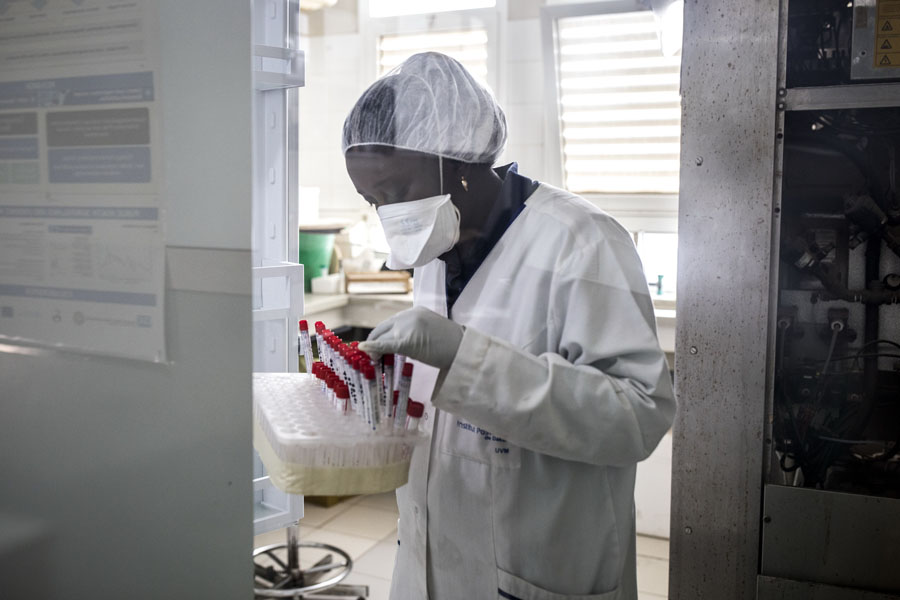
COVID-19, a watershed moment for laboratory medicine in Africa
Laboratory medicine has historically been poorly understood, undervalued, and often overlooked. Over the past two and a half years, however, the COVID-19 pandemic has been a catalyst for a greater appreciation for laboratory medicine, and a surge of investment into this crucial component of Africa’s healthcare system
The Impact of Laboratory Medicine on the Covid-19 Pandemic
“The pandemic has driven greater investment into medical laboratory and diagnostic infrastructure and services globally and has given laboratory medicine’s interests greater influence over important decision-making in healthcare,” says Cynthia Makarutse, Content Lead, Africa Health Conference 2022.
“This greater emphasis followed the recognition that the new coronavirus was airborne and could be spread by asymptomatic (or pre-symptomatic) carriers, and that diagnostic (or laboratory) testing was the only sure-fire means of accurately detecting the presence of SARS-CoV-2 molecules,” Makarutse notes.
SADC’s clinical laboratory industry is estimated to be the fastest growing in the region and is now an attractive sphere with potentially abundant opportunities for development and market expansion.
Makarutse believes that Africa’s laboratory medicine infrastructure proved vital to stalling the pandemic’s spread into the continent
The unsung heroes of the initial stages of the COVID-19 virus outbreak, clinical laboratory professionals across the continent demonstrated remarkable dedication, risking their lives, and working tirelessly to monitor, track and test, indirectly helping save countless lives, not only in Africa but around the world as the virus continued to permeate all corners of the globe.
Africa’s medical laboratories achieved this even in the face of other epidemic pathogens striking simultaneously on the continent, such as Ebola in the DRC, Lassa fever in Nigeria, as well as the ongoing international efforts against Measles and Cholera.
Fortunately, most African nations’ laboratories were prepared to test for the virus before it had hit their shores, and its health systems proceeded to invest in medical laboratory infrastructure, steadily building more testing capacity throughout the critical stages of the pandemic.
Thus, at a time when other health systems were rapidly being overwhelmed with COVID-19, most African nations managed to keep abreast of the pandemic.
“Clinicians, pathologists, and lab workers across the continent deserve commendations for their tremendous efforts in leveraging the advantage of the virus’s late arrival compared to most regions,” says Makarutse.
Their contributions, in conjunction with sound infection control policies, proactive state healthcare departments, and environmental or biological factors resulted in a relatively minor COVID-19 impact, compared to the devastation that was wrought in the likes of Asia and the EU.
“The institution of Laboratory medicine and all of its subfields – patient monitoring, epidemiological surveillance, clinical biochemistry, etiological diagnosis, haematology, and others – received renewed appreciation during the pandemic, not only within the medical industry but from the general public as well,” Makarutse observes.
She adds that the Laboratory Medicine Conference at Africa Health 2022 will hear from Rania Sharkawy, an esteemed professor, and quality director of clinical chemistry at Alexandria University
Prof. Sharkawy will explore these topics in-depth in her talk on anatomical pathology and COVID-19 entitled ‘COVID-19 – a Turning point in shaping the future of medical laboratories’, at the Laboratory Medicine Conference at Africa Health 2022.
Other highly anticipated talks in these sessions include Dr. Jean Maritz’s ‘Pitfalls in interpreting PCR test results for COVID-19’, and Lesley Scott’s ‘Use of routine laboratory data to derive epidemiologically relevant information during a pandemic’.
MedLab Africa, Africa Health’s partner exhibition, taking place at Gallagher Convention Centre in Johannesburg this October, sees a welcomed return to face-to-face proceedings after the pandemic-induced hiatus.
The event promises diverse laboratory medicine industry stakeholders and trade professionals – buyers, senior end-users, and manufacturers – an exciting new opportunity to connect and forge meaningful partnerships, as well as in-person showcases of the latest methodologies, technologies, and products.
For distributors in the laboratory medicine field, MedLab 2022 offers a springboard to launch the latest breakthroughs and innovations to enhance their competitive edge in Africa’s highly vibrant laboratory medicine market.
Amidst a surge of exciting innovation driven by the pandemic, Africa’s laboratory medicine sector has been revitalised and given a stronger voice.
Laboratory medicine professionals are using cutting-edge technologies and techniques to improve patient care, and healthcare quality standards, and work towards UHC goals on the continent, improving the continent’s healthcare systems, and contributing to global pandemic preparedness.
Read Also:
Emergency Live Even More…Live: Download The New Free App Of Your Newspaper For IOS And Android
Bolstering Monkeypox Laboratory Testing In Africa
Ethiopia To Vaccinate 2 Million Against Cholera In Tigray Region
In Chad Over 3.3 Million Children Vaccinated In Large-Scale Polio Campaign
Malawi, Polio Returns: WHO Announcement
Monkeypox Outbreak: What To Know
Monkeypox, 202 New Cases Reported In Europe: How It Is Transmitted
What Are The Symptoms Of Monkeypox?
In Zimbabwe 54,407 Chegutu Residents Receive Free Cholera Vaccination


